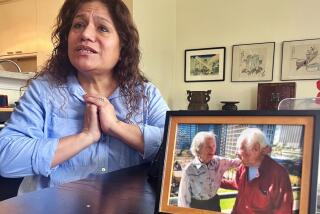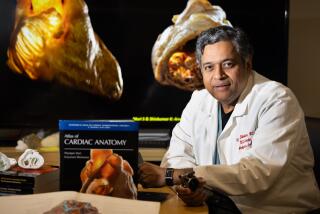A small-town doctor’s minding Einstein’s brain.
- Share via
WESTON, Mo. — The good doctor didn’t want to seem unneighborly or anything. But no, he said, he really couldn’t chat face to face. Nothing personal. . . . Something about the timing being wrong.
Well, one understands, of course. It doesn’t take the brain of Einstein to grasp the delicacy of Dr. Thomas S. Harvey’s position. For 34 years, he has been the sole guardian of the 20th Century’s most celebrated cerebrum. That’s a grave responsibility. There is the matter of decorum. One can’t expect him to go trotting out his wrinkled trophy for every visitor who chooses to call.
Why, the good doctor even hesitates to say exactly where it is he keeps Albert Einstein’s brain. “Well, with me,” is all he will say at first, before conceding finally that “I’ve kept the parts that I have in my office.”
The other parts are “spread around the country.” While Harvey keeps the major portion, he has doled out pieces of brain tissue to scientists who have asked to study it--eight in all, he says.
As Harvey tells it, Einstein’s brain virtually fell into his lap when the Nobel Prize-winning physicist died in New Jersey in 1955.
“At the time of his death I was the pathologist at Princeton Hospital, so I was the one that did the autopsy,” he explained. “I was the one who removed the brain, of course, and had it. The family knew that I knew some good neuropathologists and so, I guess, asked me to keep it. They thought it might throw some light on his genius, I guess.”
Whether it has thrown any light is open to question. In 34 years, only one scholarly article has been published, and its suggestion that Einstein’s brain differed from that of other people has not been accepted universally by scientists.
When Harvey left Princeton and settled in tiny Weston to practice medicine, he brought Einstein’s brain with him. Retired now, he moved from Weston to nearby Leavenworth, Kan., several years ago, leaving townsfolk who cared wondering whether he took the brain with him or left it in storage in Weston (where it once was reported to have been observed in his office sitting in a jar).
Under a blanket of new snow, this quaint hamlet bears an unsubtle resemblance to Bedford Falls, Jimmy Stewart’s hometown in the movie “It’s a Wonderful Life.” Once a busy port, Weston became an instant anachronism a century ago when the Missouri River changed course. It is an unlikely spot, but it is here that any quest for Einstein’s brain rightly must begin.
A newspaper reporter from Iowa appeared at Harvey’s old office here in 1984. The visitor was pleasantly received, but the face-to-face encounter with Harvey proved a disappointment.
The white-haired doctor offered a cup of coffee and a graham cracker and chatted for a few moments. But before the topic of Einstein’s brain could even be broached, he disappeared into an examining room. The scribbler was left to elicit comment from townspeople to flesh out his tale.
An amiable man on the telephone, Harvey is not incapable of finding some dry humor in his guardianship duties.
Asked why Einstein’s family would have entrusted him, a hospital staff pathologist, with the brain that unlocked the mysteries of the atom, Harvey conceded that he’s no brain specialist, but added with a wry chuckle: “I guess I’ve done as much as anybody on the brain of a genius.” It isn’t exactly a crowded field, he said.
The one scholarly article, “On the Brain of a Scientist: Albert Einstein,” appeared in 1985 in the journal Experimental Neurology.
After obtaining six cubes of tissue taken from the front and rear of both the right and left hemispheres, scientists from UC Berkeley and UCLA determined that the neurons in the portion of Einstein’s brain responsible for analyzing information received more nourishment than 11 other brains studied.
Comparing the ratio of neuron and glial cells, the scientists found a significantly greater number of glial cells in the left rear area of Einstein’s brain. Since the function of glial cells is to nourish neuron cells, they wrote that this might suggest a greater neuronal metabolic need, which “might reflect the enhanced use of this tissue in the expression of (Einstein’s) unusual conceptual powers.”
Harvey was one of four doctors whose names appeared on the article, but he didn’t actually participate in the research. Asked about the theory, he said, “That’s what the Californians say.”
Acknowledging that the notion has been disputed by other scientists, Harvey promised: “Work will be done to clarify that point.”
Einstein willed his brain to science. But on the question of whether the theoretical physicist would have wanted his brain picked over more than three decades after his death, Harvey said: “I don’t know that he ever had any point of view on that. I never heard that he did.
“But he was a scientist and grew up in Europe where a lot of autopsies were done and brains studied, you know,” he continued. “So I suspect he was aware of what was going to happen and would have approved, I think.”
As to what will eventually become of the brain, Harvey offered: “I think various research centers will have portions of it, you know, and they will continue to study it.”






